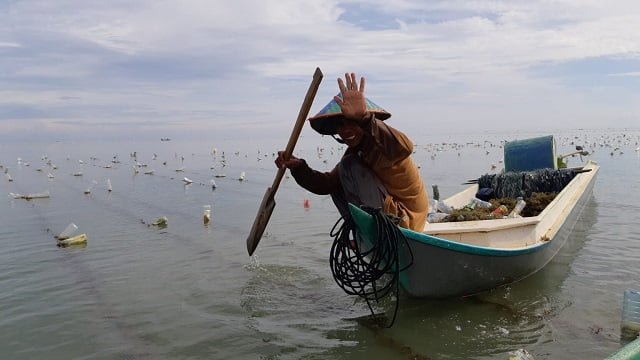
by Griffith University
Griffith Agribusiness’ most recent recruit, Dr Zannie Langford, is set to take the lead on a new project, exploring climate change resilience strategies for seaweed farmers in Indonesia.
Seaweed farming is Indonesia’s largest marine aquacultural industry, but the variability of ocean conditions and the impact of rainfall on seaweed production mean that it is already an industry characterised by risk.
As seasonal patterns become harder to predict, widespread seaweed death and significant losses of product are becoming more common, impacting the 62,000 coastal households currently involved in the industry.
Dr Langford has been awarded a grant through the Department of Foreign Affairs and Trade’s Knowledge Partnership Program to extend her work on developing an approach to seaweed mapping using satellite imagery.
The research will develop computer vision and machine-learning tools for analysis of satellite imagery to monitor seaweed production, undertake ground-truthing of production estimates using oceanographic measurements and farm production diaries, and explore community perceptions of climate variability and their resilience strategies to identify interventions.
“The impacts of climate change on seaweed production not only affects farmers, but also thousands of wage labourers whose job it is to attach the seaweed to ropes, often women with caring responsibilities, elderly people, and other vulnerable groups,” Dr Langford said.
“Despite the importance of seaweed farming to coastal livelihoods, accurate national production data by location and month is not available, which inhibits evidence-based policy making. Satellite imagery is well-established for monitoring land use change but is not yet possible for marine aquaculture except across small areas.
“Our multi-disciplinary team has the expertise in machine learning, agricultural economics, remote sensing, qualitative and quantitative social research, and applied biophysical research needed for an integrated approach.
“This project also has a strong capacity development component, as part of which we will be training six new junior researchers from Maluku, East Nusa Tenggara and South Sulawesi in social research methodologies.”
Stay Always Informed
Join our communities to instantly receive the most important news, reports, and analysis from the aquaculture industry.
Dr Langford is the newest addition to the Griffith Agribusiness team, having recently received a postdoctoral fellowship for her project studying technology-driven changes in development financing in Indonesia and the Pacific.
She has previously undertaken a range of academic and applied research projects on land tenure, global value chains, smallholder agribusiness, and rural development financing.
Editor at the digital magazine AquaHoy. He holds a degree in Aquaculture Biology from the National University of Santa (UNS) and a Master’s degree in Science and Innovation Management from the Polytechnic University of Valencia, with postgraduate diplomas in Business Innovation and Innovation Management. He possesses extensive experience in the aquaculture and fisheries sector, having led the Fisheries Innovation Unit of the National Program for Innovation in Fisheries and Aquaculture (PNIPA). He has served as a senior consultant in technology watch, an innovation project formulator and advisor, and a lecturer at UNS. He is a member of the Peruvian College of Biologists and was recognized by the World Aquaculture Society (WAS) in 2016 for his contribution to aquaculture.







